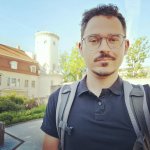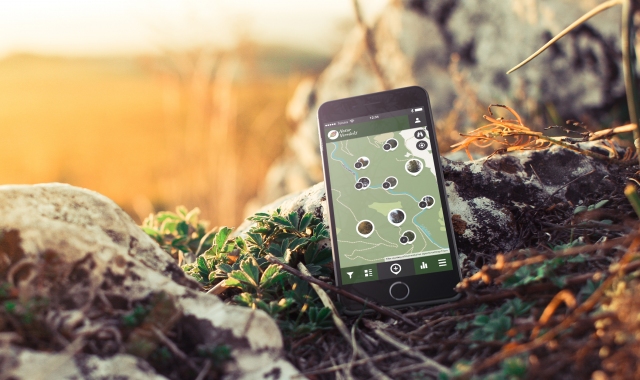
Daniel Dörler
SPOTTERON
With SPOTTERON we would like to introduce a supporter of the Citizen Science Network Austria, without whom Österreich forscht would not exist in its present form.
At the end of 2014, when Österreich forscht was still a self-built website, the founder of SPOTTERON became aware of it. He understood our approach and wanted to support it. He helped us to bring the Österreich forscht platform into its current form and to relaunch the website for the first Austrian citizen science conference in 2015. Since then, SPOTTERON has grown enormously: It offers apps and websites for citizen science projects, and some of the projects on Österreich forscht and internationally are already running on this system.
SPOTTERON also designed and programmed the conference website for ECSA and the Swiss Citizen Science Platform Schweiz forscht. In addition, there are videos on individual projects and on citizen science in general. The clips for our Citizen Science Pub Quizes were also produced by SPOTTERON, for example. You can find more information on the company website.
We are very pleased to have won SPOTTERON as an important supporter and look forward to continuing our good, future cooperation!
New blogpost on Fossilfinder
The Fossilfinder project was on Servus.TV in PM Wissen! You can find the link to the recording in the new blog post by project manager Alexander Lukender! By the way: if you would like to be automatically informed about all new blog posts about project Fossilfinder or Alexander Lukeneder (or any other project or author), you can subscribe to the team or author by clicking on the letter symbol under the team- or author-name.
Natural History Museum Vienna
The history of the Natural History Museum Vienna is marked by the collecting passion of important monarchs, the unbending spirit of research of famous scientists and the adventurous spirit of exploring travellers. Following the dedication of the Natural History Museum, the scientists of the NHM Vienna have always been unreservedly committed to "the kingdom of nature and its exploration". While in the 19th century it was above all the great research expeditions of the Austrian imperial family that penetrated deep into foreign continents, today it is the modern methods of DNA analysis and meteorite research that allow us to enter unknown worlds and reach the limits of our cosmos.
Especially at the Natural History Museum Vienna there are countless possibilities to make a significant contribution to many research and collection activities - something many interested people have already done in recent years. Citizen science is currently experiencing a considerable upswing - especially due to the digital revolution of recent years. Whether collecting snails, observing falcons or working on the museum's collections - everyone interested has the opportunity to support the work of scientists and thus create new knowledge.
We are very pleased to welcome the Natural History Museum Vienna, one of the most important research and museum locations in Austria, as a partner in the Citizen Science Network Austria.

University of Applied Sciences Carinthia
We are very pleased to welcome the University of Applied Sciences Carinthia (FH Kärnten) as a new partner in the Citizen Science Network Austria. The Carinthian University of Applied Sciences lives the model of direct practical relevance. Full-time and part-time employees as well as guest lecturers from industry and business ensure an interdisciplinary, internationally oriented university education. At present, about 30 study programmes are offered in the fields of technology, health and social affairs as well as economics.the Carinthian University of Applied Sciences is a dynamic and dialogue-oriented university of applied sciences with regional roots and international orientation. It is active in the focal areas of health and social affairs, technology and economics. Its core tasks lie in the areas of study and teaching, applied research, knowledge transfer and continuing education. For these reasons, the Carinthian University of Applied Sciences has already gained a lot of experience in participatory research and we are pleased to welcome you here.
inatura
It is with great pleasure that we welcome our newest and at the same time most western member of the Citizen Science Network Austria: the inatura in Dornbirn. The inatura is not only an interactive exhibition space where visitors can learn everything about the nature of Vorarlberg, it also offers further education courses, expert advice and is also a research centre. As a multifunctional institution, inatura is of course no stranger to citizen science: it sees itself as a hub for citizen science in Vorarlberg and informs the Vorarlberg population about citizen science projects that are being carried out in the region.
We are very pleased that inatura is now part of the network and that we will work closely together in the field of citizen science in the future.
![]()
University of Klagenfurt
The University of Klagenfurt, founded in 1970, is one of the young public universities in Austria. The degree programmes on offer cover a broad portfolio: Cultural Studies, Literature & Linguistics, Law, Economics, Social & Societal Sciences and Technical Sciences. Around 2,000 of the 12,000 students come to Klagenfurt from almost 100 countries around the world to study here. The campus of the University of Klagenfurt is located on 10 hectares near Lake Wörthersee and the Lakeside Science & Technology Park with many high-tech companies.
In addition to the four faculties and the range of subjects they represent, so-called research areas of strength have been developed, in which scientists work on modern developments and methods in basic and applied research with a high level of international resonance. These focus on the topics of "Networked and Autonomous Systems" and "Multiple Perspectives in Optimisation".
Around 1,500 people currently work at the University of Klagenfurt in teaching, research and administration on a shared campus.The short distances enable a high level of dynamism and innovation in dealing with new social requirements and challenges. From a very early stage, projects at the University of Klagenfurt were part of Österreich forscht. Contributions to the Third Mission are made across all disciplines and are visible in various social fields.
We are therefore particularly pleased that the University of Klagenfurt is now also part of the Citizen Science Network Austria and we warmly welcome them!

Die Wiener Volkshochschulen
We are very pleased to welcome the Wiener Volkshochschulen (Vienna Adult Education Centres, VHS) to the Citizen Science Network Austria. The Vienna Adult Education Centres offer courses on a wide range of topics for an interested audience. These courses are spread all over the city and offer the right course for every taste. As the largest adult education institution in the German-speaking world, the Vienna Volkshochschulen offer educational opportunities that help people to improve their situation by their own efforts.
Due to this broad range of educational opportunities, the Vienna Adult Education Centres are a very valuable partner, which can complement the network excellently with its expertise in the field of education.

University College for Agrarian and Environmental Pedagogy
We are very pleased to welcome the University College for Agrarian and Environmental Pedagogy in Ober St. Veit to the Citizen Science Network Austria. It is Austria's only training centre for agricultural and environmental pedagogues, teachers from the agricultural education system and employees of the agricultural consulting and support service. Apart from training, the University also conducts scientifically sound research in the sense of research-based teaching and learning.
We are very pleased to have the University of Agricultural and Environmental Education as the first university of education in the Citizen Science Network Austria and are convinced that the network can benefit greatly from this new expertise.

FH Salzburg
With the Salzburg University of Applied Sciences, the third university of applied sciences is already part of the Citizen Science Network Austria. With 2700 students in the faculties of engineering, social and economic sciences, design, media and art and health sciences, the FH Salzburg offers practical training and applied research. In its vision, society is at the centre of attention, which also makes the FH Salzburg a valuable partner in the Citizen Science Network Austria.
We are very pleased about the cooperation with the FH Salzburg in the network and are already looking forward to joint projects in the future.

Nationalpark Neusiedler See
The Neusiedler See - Seewinkel National Park is the only steppe national park in Austria and is home to a wealth of animal and plant species. The National Park is particularly famous for the many bird species that can be observed there. This is why the National Park is also particularly popular with ornithologists. The diversity of habitats found in the National Park is also fascinating: there is the lake with its famous reed belt, periodically drying salt lakes, mowing meadows, pastureland for grazing and sandy habitats.
The Neusiedler See - Seewinkel National Park also has a department for Monitoring, Research and Citizen Science. We are therefore honoured that the National Park team also approached the Citizen Science Network Austria to become the first National Park ever to become a member. We are very much looking forward to the future cooperation and welcome the National Park Neusiedler See - Seewinkel!











